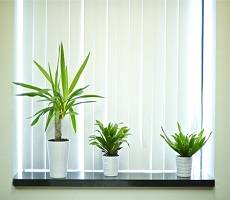September 2, 2014
Office planting improves workers’ quality of life and productivity finds study
 Claims by office designers and suppliers that office planting has wider health benefits for occupiers than just making the place look more attractive have been given a boost in a new academic study which provides some empirical evidence. In the first field study of its kind, researchers found enriching a ‘lean’ office with plants could increase productivity by as much as 15 per cent. The study, which involved academics from the University of Exeter; the University of Groningen in The Netherlands, and the University of Queensland, Australia examined the impact of ‘lean’ and ‘green’ offices on staff’s perceptions of air quality, concentration, and workplace satisfaction, and monitored productivity levels over subsequent months in two large commercial offices in the UK and The Netherlands. It concludes that ‘green’ offices with plants make staff happier and more productive than ‘lean’ designs stripped of greenery.
Claims by office designers and suppliers that office planting has wider health benefits for occupiers than just making the place look more attractive have been given a boost in a new academic study which provides some empirical evidence. In the first field study of its kind, researchers found enriching a ‘lean’ office with plants could increase productivity by as much as 15 per cent. The study, which involved academics from the University of Exeter; the University of Groningen in The Netherlands, and the University of Queensland, Australia examined the impact of ‘lean’ and ‘green’ offices on staff’s perceptions of air quality, concentration, and workplace satisfaction, and monitored productivity levels over subsequent months in two large commercial offices in the UK and The Netherlands. It concludes that ‘green’ offices with plants make staff happier and more productive than ‘lean’ designs stripped of greenery.
Lead researcher Marlon Nieuwenhuis, from the School of Psychology, said: “Our research suggests that investing in landscaping the office with plants will pay off through an increase in office workers’ quality of life and productivity.
“Although previous laboratory research pointed in this direction, our research is, to our knowledge, the first to examine this in real offices, showing benefits over the long term. It directly challenges the widely accepted business philosophy that a lean office with clean desks is more productive.”
The research showed office planting significantly increased workplace satisfaction, self-reported levels of concentration, and perceived air quality.
Analyses into the reasons why plants are beneficial suggests that a green office increases employees’ work engagement by making them more physically, cognitively, and emotionally involved in their work.
Co-author Dr Craig Knight, from the University of Exeter, said: “Psychologically manipulating real workplaces and real jobs adds new depth to our understanding of what is right and what is wrong with existing workspace design and management. We are now developing a template for a genuinely smart office.”
Professor Alex Haslam, from The University of Queensland’s School of Psychology, who also co-authored the study added: “The ‘lean’ philosophy has been influential across a wide range of organisational domains. Our research questions this widespread conviction that less is more. Sometimes less is just less”.
Marlon Nieuwenhuis added: “Simply enriching a previously Spartan space with plants served to increase productivity by 15% – a figure that aligns closely with findings in previously conducted laboratory studies. This conclusion is at odds with the present economic and political zeitgeist as well as with modern ‘lean’ management techniques, yet it nevertheless identifies a pathway to a more enjoyable, more comfortable and a more profitable form of office-based working.”
The Relative Benefits of Green Versus Lean Office Space: Three Field Experiments, is published in the latest issue of the Journal of Experimental Psychology: Applied.












